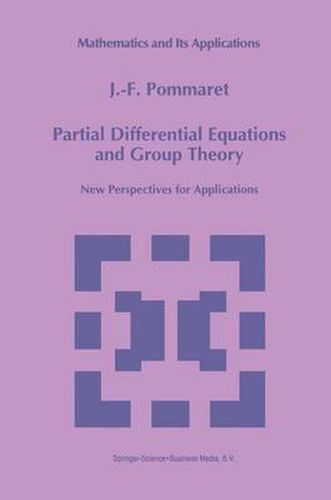Readings Newsletter
Become a Readings Member to make your shopping experience even easier.
Sign in or sign up for free!
You’re not far away from qualifying for FREE standard shipping within Australia
You’ve qualified for FREE standard shipping within Australia
The cart is loading…






This title is printed to order. This book may have been self-published. If so, we cannot guarantee the quality of the content. In the main most books will have gone through the editing process however some may not. We therefore suggest that you be aware of this before ordering this book. If in doubt check either the author or publisher’s details as we are unable to accept any returns unless they are faulty. Please contact us if you have any questions.
The formal theory of systems of partial differential equations (PDEs) was developed by D.C. Spencer in the U.S.A. during 1960–1975; it studies the solution spaces of systems of PDEs without especially integrating them. It also allows the study of Lie pseudogroups, i.e. groups of transformation solutions of systems of PDEs. Although this work supersedes the classical approaches of M. Janet and E. Cartan, it is still largely unknown by mathematicians and has never been used by physicists. This book provides a self-contained introduction to these methods, with illustrations and specific examples coming from many branches of physics, the engineering sciences and applied mathematics. The algorithms involved are presented in a way that allows the use of computer algebra for the intrinsic study of nonlinear PDEs. The book also for the first time presents the group-theoretical unification of the finite element methods for elasticity, heat and electromagnetism. The book contains the material of an intensive course which has been given many times with much success throughout Europe, and can be used for a one-year course at graduate level. For researchers in mathematics, mathematical physics, computer algebra, control theory and theoretical mechanics.
$9.00 standard shipping within Australia
FREE standard shipping within Australia for orders over $100.00
Express & International shipping calculated at checkout
Stock availability can be subject to change without notice. We recommend calling the shop or contacting our online team to check availability of low stock items. Please see our Shopping Online page for more details.
This title is printed to order. This book may have been self-published. If so, we cannot guarantee the quality of the content. In the main most books will have gone through the editing process however some may not. We therefore suggest that you be aware of this before ordering this book. If in doubt check either the author or publisher’s details as we are unable to accept any returns unless they are faulty. Please contact us if you have any questions.
The formal theory of systems of partial differential equations (PDEs) was developed by D.C. Spencer in the U.S.A. during 1960–1975; it studies the solution spaces of systems of PDEs without especially integrating them. It also allows the study of Lie pseudogroups, i.e. groups of transformation solutions of systems of PDEs. Although this work supersedes the classical approaches of M. Janet and E. Cartan, it is still largely unknown by mathematicians and has never been used by physicists. This book provides a self-contained introduction to these methods, with illustrations and specific examples coming from many branches of physics, the engineering sciences and applied mathematics. The algorithms involved are presented in a way that allows the use of computer algebra for the intrinsic study of nonlinear PDEs. The book also for the first time presents the group-theoretical unification of the finite element methods for elasticity, heat and electromagnetism. The book contains the material of an intensive course which has been given many times with much success throughout Europe, and can be used for a one-year course at graduate level. For researchers in mathematics, mathematical physics, computer algebra, control theory and theoretical mechanics.